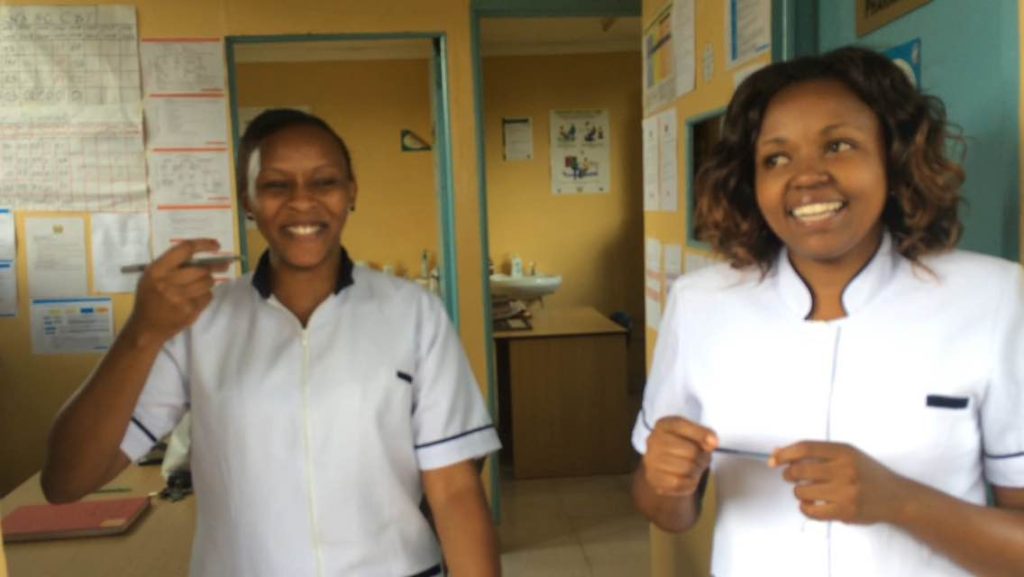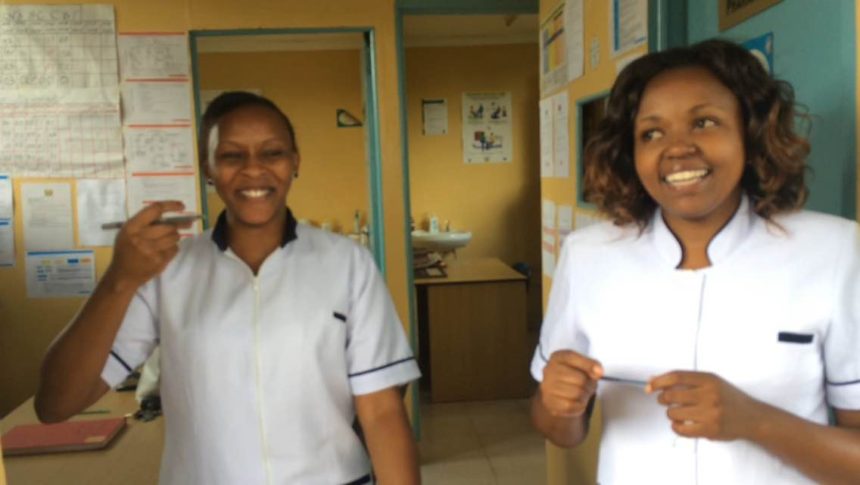 We thank God for Ephel Achero from IMC and her indefatigable commitment to the cause of women’s health in Kenya. She routinely replaces broken equipment and flew from western Kenya for the day to facilitate this visit. What we thought could be the low point in our travels in Kenya was quite the opposite.Meanwhile, back at the Ruiru SubCounty Hospital clinic on the other side of Nairobi, a fresh set of trainees – 16 this time – were on Day 1 of their training, ably instructed by Dr. Stuart Fischbein, MD OB/GYN – who effortlessly stepped into the role of lecturer, medical director and mentor. The eagerness of the trainees was evident, and the support of people like Radha Karnad, Clinic Programs Manager, and her team at Jacaranda Health was indispensable to the continuation of this critical work.
We thank God for Ephel Achero from IMC and her indefatigable commitment to the cause of women’s health in Kenya. She routinely replaces broken equipment and flew from western Kenya for the day to facilitate this visit. What we thought could be the low point in our travels in Kenya was quite the opposite.Meanwhile, back at the Ruiru SubCounty Hospital clinic on the other side of Nairobi, a fresh set of trainees – 16 this time – were on Day 1 of their training, ably instructed by Dr. Stuart Fischbein, MD OB/GYN – who effortlessly stepped into the role of lecturer, medical director and mentor. The eagerness of the trainees was evident, and the support of people like Radha Karnad, Clinic Programs Manager, and her team at Jacaranda Health was indispensable to the continuation of this critical work.
En route through the perilous Nairobi traffic, we brace ourselves for what is to come. The Langata Women’s Prison is a maximum security facility on the edge of the notorious Kibera slum, visible from most vantage points in the area, with a reputation for trying living conditions and random, often brutal crime and mob punishment. What we find is quite remarkable.The place is spotless. The guards – mostly women, generally unarmed save for a walking stick-like baton, smile readily and seem popular with the women prisoners. The officer in charge was charming and hospitable, offering us a tour of the prison, and informing us that a group of SoCal dancers were shooting a video of a performance inside the jail. Children of the inmates join them behind the impressive gates – a gesture that no doubt has saved many young lives and families on the outside. Drug crimes – from selling, stealing and smuggling – are pervasive amongst the population. The ‘condemned’ building – housing those who would otherwise be on death row (now abolished) appear to be treated little differently to the petty street crimes – some apparently committed deliberately for a stay in this place – a veritable sanctuary compared to the sprawling slum just down the embankment.Flowers bloom, gardens are well maintained, roses are trained along high stone walls. The maternity ward has about a dozen women – the tuberculosis ward is disturbingly adjacent and has just 4 patient/inmates…their only crime being the fact of their TB status.They remain behind bars for the duration of their 9 -month treatment.We move past the humble but busy schoolhouse to the medical clinic – again, clean and well-maintained. Our purpose is to check on the condition of the cryo-gun and equipment provided by CCC a year earlier. The recently trained nurses have returned from their week in Kisii newly energized to tackle the institutional apathy and other problems encountered in screening and treating the 350+ population. The high turnover of inmates is due to the high incidence of effective self-admission to the jail, often for reasons of protection; usually from husbands and/or local criminal gangs. Their uniforms uniformly spotless, even somewhat fashion forward (bright orange sweaters over gray striped dresses). Nurses also work as guards, and their high turnover in the system makes continuity of treatment an ongoing challenge. We thank God for Ephel Achero from IMC and her indefatigable commitment to the cause of women’s health in Kenya. She routinely replaces broken equipment and flew from western Kenya for the day to facilitate this visit. What we thought could be the low point in our travels in Kenya was quite the opposite.Meanwhile, back at the Ruiru SubCounty Hospital clinic on the other side of Nairobi, a fresh set of trainees – 16 this time – were on Day 1 of their training, ably instructed by Dr. Stuart Fischbein, MD OB/GYN – who effortlessly stepped into the role of lecturer, medical director and mentor. The eagerness of the trainees was evident, and the support of people like Radha Karnad, Clinic Programs Manager, and her team at Jacaranda Health was indispensable to the continuation of this critical work.
We thank God for Ephel Achero from IMC and her indefatigable commitment to the cause of women’s health in Kenya. She routinely replaces broken equipment and flew from western Kenya for the day to facilitate this visit. What we thought could be the low point in our travels in Kenya was quite the opposite.Meanwhile, back at the Ruiru SubCounty Hospital clinic on the other side of Nairobi, a fresh set of trainees – 16 this time – were on Day 1 of their training, ably instructed by Dr. Stuart Fischbein, MD OB/GYN – who effortlessly stepped into the role of lecturer, medical director and mentor. The eagerness of the trainees was evident, and the support of people like Radha Karnad, Clinic Programs Manager, and her team at Jacaranda Health was indispensable to the continuation of this critical work.
 We thank God for Ephel Achero from IMC and her indefatigable commitment to the cause of women’s health in Kenya. She routinely replaces broken equipment and flew from western Kenya for the day to facilitate this visit. What we thought could be the low point in our travels in Kenya was quite the opposite.Meanwhile, back at the Ruiru SubCounty Hospital clinic on the other side of Nairobi, a fresh set of trainees – 16 this time – were on Day 1 of their training, ably instructed by Dr. Stuart Fischbein, MD OB/GYN – who effortlessly stepped into the role of lecturer, medical director and mentor. The eagerness of the trainees was evident, and the support of people like Radha Karnad, Clinic Programs Manager, and her team at Jacaranda Health was indispensable to the continuation of this critical work.
We thank God for Ephel Achero from IMC and her indefatigable commitment to the cause of women’s health in Kenya. She routinely replaces broken equipment and flew from western Kenya for the day to facilitate this visit. What we thought could be the low point in our travels in Kenya was quite the opposite.Meanwhile, back at the Ruiru SubCounty Hospital clinic on the other side of Nairobi, a fresh set of trainees – 16 this time – were on Day 1 of their training, ably instructed by Dr. Stuart Fischbein, MD OB/GYN – who effortlessly stepped into the role of lecturer, medical director and mentor. The eagerness of the trainees was evident, and the support of people like Radha Karnad, Clinic Programs Manager, and her team at Jacaranda Health was indispensable to the continuation of this critical work.